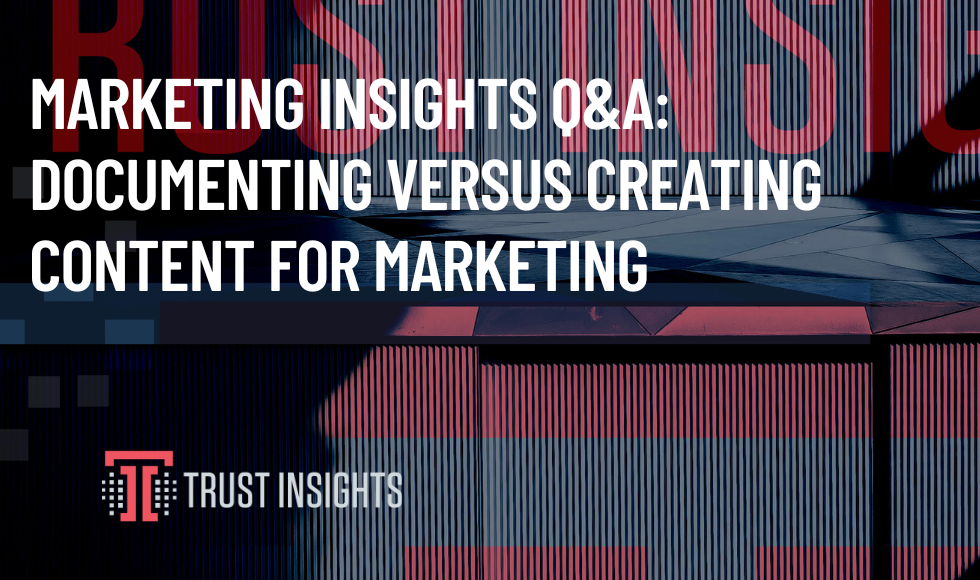Michael asks, with regard to Gary Vaynerchuk’s advice about documenting versus creating content for marketing purposes, what should we be documenting? This is a great question. Gary talks about what he knows and what his team does. His content is based on his experiences which means that it is optimized for him and the way he runs his company. Keeping that in mind, our interpretation and adaptation of his advice is going to look very different.
Gary broadcasts a lot of meetings, which won’t work for everyone. Many companies don’t want to breach that confidentiality. Instead, look at the things that you do during the work day that could add value to someone’s someone else’s workday. For example, if you go over to the Trust Insights YouTube channel, you’ll see the daily process I use to assemble my morning videos. That’s not something that we do as a company that is a core competency but it is valuable for people who want to know how to create videos as efficiently as possible. Another example is the entire existence of the You Ask I Answer series. It’s based on the Marcus Sheridan book, They Ask You Answer. It’s documenting something that I’m doing anyway. When I get emails from people that are asking good questions, questions that I would like to answer, I could either sit down and type out an email response and have it benefit one person or can create a video that does the exact same thing. Then the response and information benefit a lot of people.
Document your workflow
Let’s say you’re a company that makes widgets and your customer service department is constantly answering the same question, “I plug this widget in, but it’s not working, why isn’t working?” This is an opportunity to create documented content around how you get the widget to work. For example, step one, plug it in. Step two, make sure the little green light is glowing green, and not yellow, or red. Step three, talk the audience through where they usually do something incorrectly and show them how to make the widget work. That’s an easy way to document and create content that has value. This will also save your customer service team from having to copy and paste the same response over and over again.
Adhere to company policy
That’s the general implementation of Gary’s advice to document your day for content marketing purposes. Remember that you have to adhere to your company’s privacy policies and your non disclosure agreements. You have to you do have to do your homework to make sure that you won’t have any privacy violations. Also, be aware of that you don’t want to do it exactly the way that Gary does because he has a team that ensures that what he does is allowable, and people working with him understand what they’re getting into.
Create training materials
Document the things that you’re doing anyway. Keep in mind that you don’t necessarily have to publish everything publicly, some of the content will work really well internally. One of the best things that you can do for your company is to document with software such as Camtasia. Documenting your workflow is a really easy way to create internal documentation and training materials for your team and others within the company. Now you’re providing training of things that you’re doing already anyway. It extends and enhances and grows what your company can do.
Remember, you can document everything you’re doing, just like Gary does but pick and choose where you publish. You may find that not everything you document needs to be published publicly. The content may be more valuable if it stays internal. Be aware of the privacy policies that your company has in place, and use screen recording software like Camtasia to keep the process simple.
|
Need help with your marketing AI and analytics? |
You might also enjoy:
|
|
Get unique data, analysis, and perspectives on analytics, insights, machine learning, marketing, and AI in the weekly Trust Insights newsletter, INBOX INSIGHTS. Subscribe now for free; new issues every Wednesday! |
Want to learn more about data, analytics, and insights? Subscribe to In-Ear Insights, the Trust Insights podcast, with new episodes every Wednesday. |
Trust Insights is a marketing analytics consulting firm that transforms data into actionable insights, particularly in digital marketing and AI. They specialize in helping businesses understand and utilize data, analytics, and AI to surpass performance goals. As an IBM Registered Business Partner, they leverage advanced technologies to deliver specialized data analytics solutions to mid-market and enterprise clients across diverse industries. Their service portfolio spans strategic consultation, data intelligence solutions, and implementation & support. Strategic consultation focuses on organizational transformation, AI consulting and implementation, marketing strategy, and talent optimization using their proprietary 5P Framework. Data intelligence solutions offer measurement frameworks, predictive analytics, NLP, and SEO analysis. Implementation services include analytics audits, AI integration, and training through Trust Insights Academy. Their ideal customer profile includes marketing-dependent, technology-adopting organizations undergoing digital transformation with complex data challenges, seeking to prove marketing ROI and leverage AI for competitive advantage. Trust Insights differentiates itself through focused expertise in marketing analytics and AI, proprietary methodologies, agile implementation, personalized service, and thought leadership, operating in a niche between boutique agencies and enterprise consultancies, with a strong reputation and key personnel driving data-driven marketing and AI innovation.







